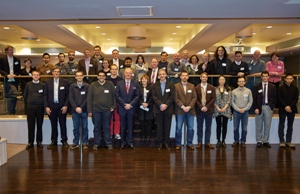Fifty new star signings showing Reading's limitless ambitions
Release Date 28 November 2013

How do you wire up a human brain to a computer? Is there a cure for Alzheimer's? Can we feed 9 billion people by 2050?
These are just some of the challenges that the University of Reading's 54 latest academic stars will be helping to explore after joining Reading this year.
The new members of staff have come to Reading from across the world as part of the University's academic investment programme - a multi-million pound project designed to strengthen key areas of research, helping to find answers to some of society's biggest issues.
Other important research questions the scheme aims to investigate include:
- How are people changing the climate - and how should we adapt?
- Should we learn foreign languages, not just for business, but for our own wellbeing?
- Can we build more new homes sustainably and affordably?
- How should the law be updated for the digital age?
Around 40 new academics have already joined the University staff, with the remainder set to come to Reading in 2014.
The ambitious investment programme comes as the University's leaders attend the Times Higher Education (THE) Awards this week, for which Reading has been nominated for four awards - the joint highest number of any university in the country.
Sir David Bell, University of Reading Vice-Chancellor, said: "Reading has a long and proud history of world-class research achievements. But we cannot rest on our laurels. I'm proud that Reading's current successes have been recognised with the joint highest number of nominations at the THE Awards - but our new academic investment shows we're also looking to the future.
"This significant investment sends a message about Reading's ambitions as a university. We will create more knowledge that is vital to humanity, educate the next generation of leaders across society, and use our ideas and expertise to boost business and industry."
The University of Reading's nominees in the THE Awards are:
- Henley Business School, nominated for business school of the year. Established in 1945, Henley is the oldest business school in Britain, and is among an elite group of business schools - fewer than 1% in the world - to be triple-accredited for the quality and capability of its faculty and output.
- Professor William Harwin, from the School of Systems Engineering, nominated for outstanding contribution to innovation and technology, for his work on the hapTEL Virtual Dental Lab. The lab includes a virtual dentist's chair for trainee dentists at King's College London Dental Institute, which recreates the look, sound and feel of drilling teeth.
- Professor Rachel McCrindle, nominated in the most innovative teacher of the year category, has already been awarded a National Teaching Fellowship by the Higher Education Academy for her innovative and engaging teaching methods.
- Dr Rosalind Cornforth, from the Department of Meteorology, is shortlisted in the international collaboration of the year category, for her work on the Africa Climate Exchange (AfClix) project. The scheme helps meteorologists to work with people and groups in Africa, where accurate weather information is crucial to the lives of millions of people.
ENDS
For more information please contact Pete Castle at the University of Reading press office on 0118 378 7391 or p.castle@reading.ac.uk.
Notes to editors:
The winners of the Times Higher Education Awards 2013 will be announced on 28 November 2013 at an event in London. More details at www.the-awards.co.uk
The University of Reading is ranked in the top 1% of universities in the world (THE World University Rankings).
The Academic Investment Project is projected to cost £13.1 million over its first five years, with ongoing costs of £3.8m a year. See how Reading is investing >>>